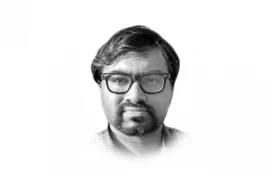
Pakistan operates on a system of gatekeeping, whereby key roles are kept off limits for 'ordinary' people. The public sector is destroyed through bureaucratic inertia. The private sector, far from efficient, is geared around pleasing a seth at the top who treats the corporation as his personal empire. In such a context, the potential of early graduates is neutralised early. Lacking mentors or trustworthy authority figures, they are confined to submissive, one-dimensional roles in their careers. Their dreams are dead before they have had a chance to mature. Every so often, however, someone comes around and simply refuses to abide by this culture of fear and intimidation. This is an essay about a man that chose to go against the grain.
It was June 2021 and I was called in to interview with the Pakistan Institute of Development Economics, arguably the biggest think tank in Pakistan - formally under the Ministry of Planning, Development and Special Initiatives. I was told I would be speaking to the Vice Chancellor himself, Dr Nadeem Ul Haque. Although I'd heard the name frequently, most spoke of him as an angry, unapologetic individual that was hell-bent on peddling 'free market' doctrine as the ultimate policy measure for Pakistan. Both items shocked me: that I would be speaking directly with the head of a key state institute (rather than having to go through a maze of administrative personnel first) and the fact that he had agreed to entertain me - someone who was seen and acknowledged as a virulent opponent of his purported ideology! Something was clearly amiss, and I was deeply intrigued.
I went into his office on the day. He looked up, and the first words that came out of his mouth were, "I hear you're a Leftie!" Oh boy. "Here we go," I thought to myself. We spoke for about an hour, exchanging views on economic insecurity, role of government, the 'woke' movement, civil service reform, industrial policy, 'development sector' activities, and more. It was a combative discussion, but not once did I feel like I was being dismissed or patronised. I had never experienced anything like it in a Pakistani workplace setting: being able to disagree without it getting hostile. What a breath of fresh air. "Moosvi, it's been a fun chat - we'll call you." I was hired shortly afterwards.
The spirit of that first conversation defined the nature of my work at PIDE for the subsequent three years. Dr Nadeem always promoted open debate as a central vehicle for progress. He urged us, as researchers and faculty members, to avoid the trap of academic impartiality, take bold stances and have the depth of understanding to be able to defend them in the face of public scrutiny. Linked to this was his emphasis on organic, localised knowledge production: focusing on context-specific theses over textbook regurgitations or donor-driven agendas.
'Getting people involved' was a key cornerstone of his overarching philosophy. The countless webinars, podcasts, seminars, conferences, workshops, guest lectures, WhatsApp groups, etc that were being put together functioned to build a vast thought community around the institute. He encouraged us young lot to lead these activities without paying any heed to traditional barriers of rank or seniority. "Be brave," and "Take them on!" were his go-to lines. By granting open access to all these platforms, he helped us integrate into key networks of the policy domain in Pakistan. I was invited to speak at universities, think tanks, community centres and on podcasts and domestic/international media platforms - all of which gave me tremendous career leverage. He saw 'presence' as key and pushed us to build recognisable personal brands. In this way, he behaved exactly contrary to the traditional 'head of institute' that obsesses over his authority, ensuring it remains concentrated in and around himself.
It was in this context that he nominated me to take over as Editor of Discourse, PIDE's bimonthly magazine on public policy and political economy. "I'm disappointed with the publication. It was meant to be a key output at PIDE but hasn't seemed to garner the engagement I had hoped for. I've called you in today to offer it to you, and should you decline we will discontinue it altogether. Have you done anything of the sort before?" "Not exactly." "Well, take a few days and think up a strategy. You can do it, Moosvi!" Fast forward two years, and the publication has featured over 300 of the top minds from across the country, been assigned as required reading material at various CSS academies; it is engaged with in high public offices and circulated among all major universities, Discourse was PIDE's most outwardly oriented publication, featuring external voices in a collaborative spirit - and I was granted almost 100% creative freedom and autonomy in my role as Editor. Despite initial skepticism about my relative inexperience, outspoken nature and 'radical' politics, Dr Nadeem's trust - based on extrapolation from my temperament and existing work - allowed me to transform the magazine into a widely respected publication. Rather than fixating on things like credentials, punctuality, attendance and the extent to which one followed 'the rules', he was much more interested in proactivity, creativity, innovation and productivity.
We often disagreed and bickered, but mutual respect and a love of ideas always defined our interactions. Through my 'debates' with him, I was able to clarify a whole host of concepts for myself. His 'opposition' was like a whetstone that helped sharpen my blade. Looking back, I realise he had little to gain from the exchanges. He simply indulged because he knew that raising one's voice or threatening others with punishment was bound to fail - and that the only way forward was to enhance the quality of one's arguments. There are no winners or losers in academia: only theses and antitheses that can someday hopefully synthesize.
As Dr Nadeem's tenure concludes, PIDE stands as an outstanding example of what government bodies can potentially look like and achieve. It was an institute where senseless permissions, outmoded notions of 'respect' and endless reams of bureaucratic procedures were laid to rest - in their stead appearing a vibrant, youthful, outward-oriented cadre of motivated individuals producing work that was both useful and relatable. If even a fifth of Pakistan's organisations can replicate a similarly open, meritocratic internal culture, the sky would truly be the limit.

1726194599-0/Taylor-(2)1726194599-0-405x300.webp)

1726189678-0/jenna-(1)1726189678-0-165x106.webp)









COMMENTS
Comments are moderated and generally will be posted if they are on-topic and not abusive.
For more information, please see our Comments FAQ